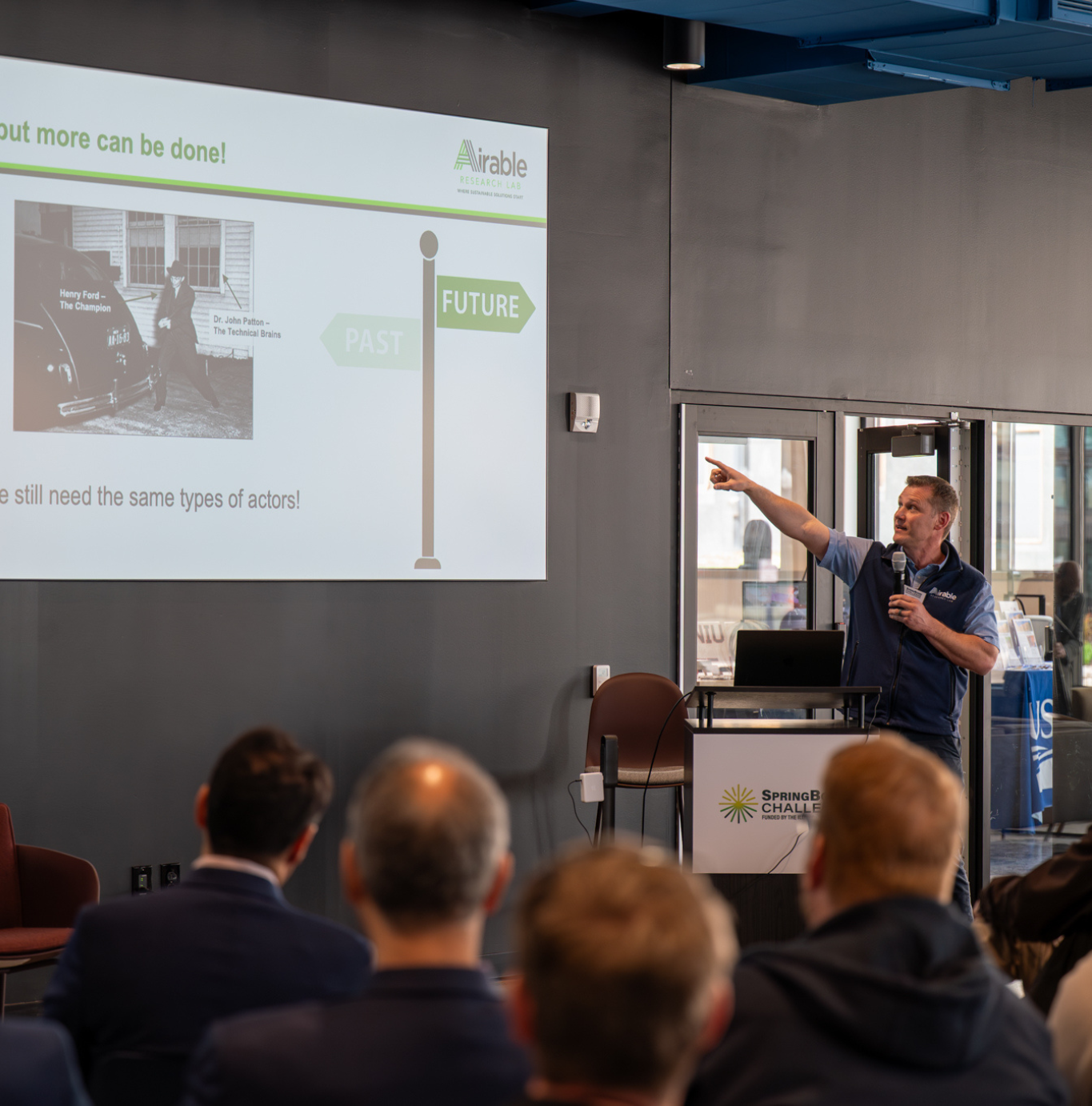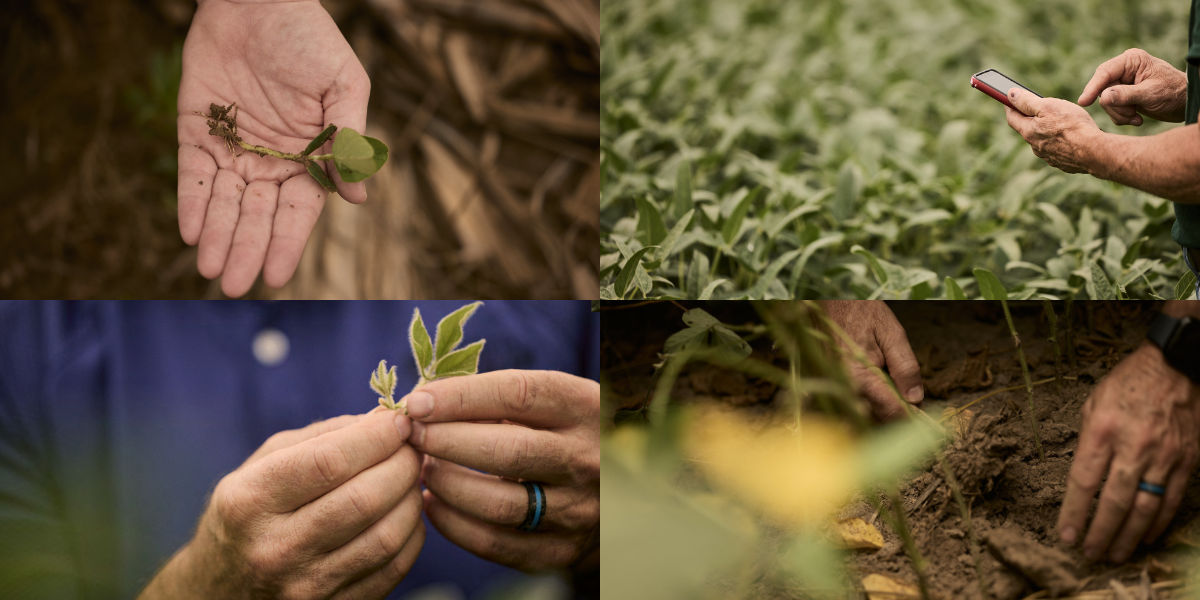April Event United Stakeholders to Innovate, Diversify Illinois Soybean Market Opportunities
Illinois soybean farmers produced 688 million bushels in 2024, giving the state a competitive market advantage in both quantity and quality. As a result, Illinois soybeans are paving a stronger path forward for the state’s economy, especially in the rural communities that farmers and their families call home.
Connecting Illinois soybeans—and the farmers who produce them—with the innovators driven to find new uses for the crop was the main goal of the Soy Innovation Center SpringBoard 2025 event held April 15-16 at Distillery Labs in Peoria. The event brought together the state’s top soybean farmers, public and private researchers, companies developing new uses for the state’s soybeans and venture capitalists who can provide funding to make it all happen.
The event, co-hosted by the Illinois Innovation Network, the Soy Innovation Center (SIC) and the Institute for Work & the Economy, focused on how all parties can work together on market-moving innovations that can yield both short- and long-term financial gains for farmers and their communities. The lasting impact of the event—also made possible by the Illinois Soybean Association (ISA)—will extend well beyond the state’s soybean fields.
The SpringBoard event is a key platform for sharing valuable research findings, best management practices and market insights. SpringBoard provided Illinois soybean farmers, researchers and companies the knowledge and connections they need to innovate, collaborate and succeed.
Topics included the latest advancements in soybean-based materials for manufactured goods, sustainable agriculture practices and emerging markets for bio-based products. The lineup featured farmers and other experts in agricultural technology and commercialization.
Presenters included: ISA CEO John Lumpe; Jeannette Tamayo, Interim Executive Director of the Illinois Innovation Network; Doug Cruitt, Executive Director of Distillery Labs; CLO of Airable Research Labs Barry McGraw; ISA Director of Market Development Todd Main; and ISA At-Large Director Scott Gaffner.
“With the SpringBoard event, we’re capitalizing on the assets that exist in Illinois beyond what the farmers produce,” said Main. “We have world-class research facilities and researchers, financial mechanisms and firms that can support innovation, and the ability to put it all together to create new opportunities and good jobs in our rural communities. We wanted to plant a flag so the research community knows we’re focused on creating an ecosystem to advance new market opportunities for Illinois soybean farmers, innovators and rural communities across the state.”
Participants learned about cutting-edge research, explored potential new revenue streams, and connected with industry stakeholders shaping the future of agriculture. The event was geared to highlight new demand streams for Illinois soybeans and create market-based results to build rural economic vitality and opportunity.
In addition to headlining speakers, roundtables on the first day featured:
- The state of R&D and innovation
- Industry interests, opportunities and problems to be solved
- The state of affairs at Illinois research institutions
Day two topics included views from the venture capital investment community, the Central Illinois Innovation Corridor, the Soy Innovation Center’s Springboard Challenge and ways to build a sustainable innovation ecosystem for agricultural product innovation.
The event also included a tour of the USDA-ARS National Center for Agricultural Utilization Research in Peoria.
Given the resources in the state from the soybean field to the consumer, it’s a market development model unique to Illinois that Main and others are intent on growing throughout the state’s economy. As soybean farmers continue to push the crop yield threshold higher, the industry needs to keep pace with market development. That’s where the soybean checkoff enters the equation.
According to ISA District 2 Director Steve Pitstick, who farms near Maple Park, SpringBoard 2025 was about directing as much energy toward new uses within state lines as is directed toward developing markets overseas. Just as Pitstick and other farmers work to maximize soybean yields, so too must checkoff-funded market development activities work to expand the number of ways the crop is utilized in the broad marketplace.
“As farmers, we’re trying to raise more soybeans every year as the industry brings us higher-yielding varieties,” Pitstick said. “With the checkoff, we’re trying to match that pace by finding that next buyer through new uses, like in the industrial sector where we can replace petroleum products. The SpringBoard event was a sort of cross-pollination where we brought together farmers, researchers, scientists and industry members to find the next way we can collaborate to build new demand.”
Although building new demand for Illinois soybeans is fundamental, SpringBoard did much more than that. The event served as an early step in the process of building an entrepreneurial ecosystem to generate new ideas, build new businesses and provide the resources those businesses need to succeed.
Event Highlighted Promise for Rural Illinois
According to Peter Creticos, Executive Director of the Institute for Work & the Economy, a workforce and economic development policy collaborative, that process needs to include everyone from initial innovators and soybean farmers to venture capitalists who can breathe life into the new businesses and demand drivers through funding.
“We want to encourage both established and new businesses rooted in innovation to invest in the farming communities many of them already call home,” Creticos said. “That effort can create new vitality in those communities through economic returns on investment for the businesses themselves as well as opportunities for residents. It all starts with people coming forward with their new ideas.”
But it’s not just about new businesses. Given the competitive advantages in the state, Creticos said, SpringBoard and similar events are important in launching innovations that not only create new economic opportunity but do so where Illinois soybean farmers and their families call home.
“When a company is located 60 miles away and members of a community have to pick up, drive 60 miles to work and 60 miles back, it can really be disruptive to the culture of a community,” Creticos said. “We are working with all stakeholders to weave innovative businesses into the fabric of our communities in ways that improve the quality of life for farm families.”
Multiplying the Value of the Soybean Checkoff
Key agronomic advances to evolve soybean production and overseas market development work are two big pieces of the foundation of the soybean checkoff’s value to farmers. The SpringBoard event represented the convergence of Illinois farmers’ advanced capabilities to grow the increasingly valuable crop and similar market development, within the state’s borders. The event will help keep crop revenue at home and bolster the communities dotting rural Illinois that are so important to the success and vitality of thousands of farm families.
“Checkoff programs spend a lot of energy and money on the agronomy side, with new farming technologies and ways to improve crop yields,” Creticos said. “This is one of the ways that spending touches a new way to diversify markets for the crop. ISA is really looking at the full equation—what’s pulling prices and what’s ‘moving the pile of soybeans.’ There will be long-term benefits for soybean farmers, but these efforts also will show benefits fairly quickly, too. It’s exciting to see how much of a positive impact such an event can have for rural economic development in our state.”
Recent Articles
In this issue of Illinois Field & Bean Magazine, we're looking forward to the 2026 Soybean Summit.
By
Sulfur is essential for plant growth, yet it's only just becoming a common addition to fertilizer management plans. This shift is no coincidence.
By Darby Danzl, ISA Regional Technical Agronomist


